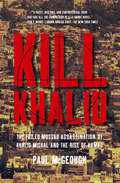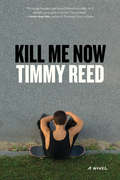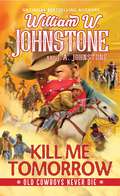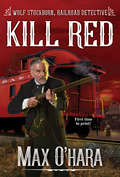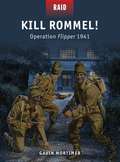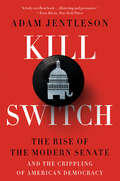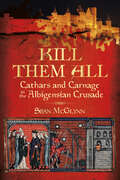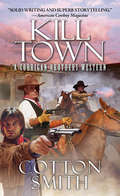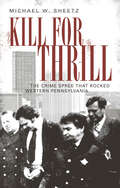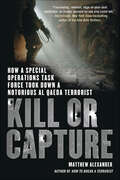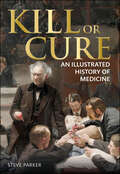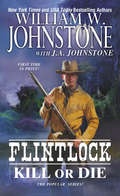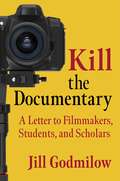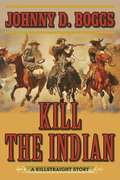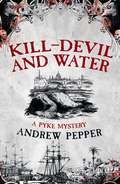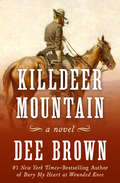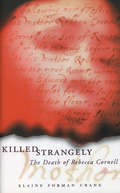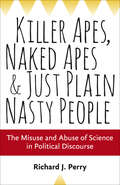- Table View
- List View
Kill Her Twice
by Stacey LeeA YA murder mystery noir set in 1930s Los Angeles&’s Chinatown, from the New York Times bestselling author of The Downstairs Girl.&“A captivating and crackling noir full of suspenseful twists. Readers will fall in love with the Chow sisters and their quest for the truth.&” —Kathleen Glasgow, #1 New York Times bestselling author of Girl in Pieces and The AgathasLOS ANGELES, 1932: Lulu Wong, star of the silver screen and the pride of Chinatown, has a face known to practically everyone, especially the Chow sisters—May, Gemma, and Peony—Lulu&’s former classmates and neighbors. So the girls instantly know it&’s Lulu when they discover a body one morning in an out-of-the-way stable, far from the Beverly Hills home where she lived after her fame skyrocketed.The sisters suspect Lulu&’s death is the result of foul play, but the police don&’t seem motivated to investigate. Even worse, there are signs that point to a cover-up, and powerful forces in the city want to frame the killing as evidence that Chinatown is a den of iniquity and crime, even more reason it should be demolished to make room for the construction of a new railway depot, Union Station.Worried that neither the police nor the papers will treat Lulu fairly—no matter her fame and wealth—the sisters set out to solve their friend&’s murder themselves, and maybe save their neighborhood in the bargain. But with Lulu&’s killer still on the loose, the girls&’ investigation just might put them square in the crosshairs of a cold-blooded murderer.
Kill Hitler - Operation Valkyrie 1944
by Peter Dennis Neil ShortAt the end of 1943 the SS and the Gestapo arrested several prominent Germans involved in plotting to overthrow Adolf Hitler, including Dietrich Bonhoffer, Klaus Bonhoffer, Josef Muller and Hans Dohnanyi. Others under suspicion, such as Wilhelm Canaris and Hans Oster, were dismissed from office in January 1944. Major Claus von Stauffenberg emerged as a leader of the group of German Army officers opposed to Nazi rule, and began to plan for the assassination of Adolf Hitler, Hermann Goering and Heinrich Himmler, and for a takeover by the Army. Once these three prominent Nazis had been killed, the plan called for troops in Berlin and other major German-controlled areas, commanded by his co-conspirators, to seize key government buildings, telephone and signal centres and radio stations. At least six attempts were aborted before von Stauffenberg decided on trying again during a conference attended by Hitler on 20 July 1944. It was decided to abandon the plans to kill Goering and Himmler at the same time, and to focus solely on removing the Führer. Von Stauffenberg carried the bomb in a briefcase and placed it on the floor beside Hitler before excusing himself to make a phone call. The bomb exploded killing four men in the hut. Hitler was injured but survived the bomb blast. The plan that called for Ludwig Beck, Erwin von Witzleben and Erich Fromm to take control of the German Army and declare martial law was abandoned when it became known that Hitler had survived the assassination attempt. In an attempt to protect himself, Fromm organized the execution of Claus von Stauffenberg and two other conspirators, Friedrich Olbricht and Werner von Haeften, in the courtyard of the War Ministry. It was later reported that von Stauffenberg died shouting "Long live free Germany". As a result of the 20 July Plot, the new chief of staff, Heinz Guderian, demanded the resignation of any officer who did not fully support the ideals of the Nazi Party and presided over the Army Court of Honour that expelled hundreds of officers suspected of being opposed to the policies of Adolf Hitler. This removed them from military jurisdiction and left them to be sentenced by Roland Freisler and his fanatically pro-Nazi People's Court. Over the next few months most of the group including Wilhelm Canaris, Carl Goerdeler, Julius Leber, Ulrich Hassell, Hans Oster, Peter von Wartenburg, Henning von Tresckow, Ludwig Beck, Erwin von Witzleben and Erich Fromm were either executed or committed suicide. It is estimated that nearly 5,000 Germans were executed as a result of the events of the July Plot. Hitler ordered that the leaders should have a slow death. They were hung from meathooks with piano wire, and their executions were filmed and later shown to senior members of both the NSDAP and the armed forces.
Kill Khalid: The Failed Mossad Assassination of Khalid Mishal and the Rise of Hamas
by Paul McGeough&“Meticulously researched . . . This is the definitive chronicle of the Middle East crisis during the Clinton years and in the post-9/11 era&” (Publishers Weekly). &“Providing a fly-on-the-wall vantage of the rising diplomatic panic that sent shudders through world capitals,&” Kill Khalid unfolds as a masterpiece of investigative journalism (Toronto Star). In 1997, the Israeli intelligence agency Mossad poisoned Hamas leader Khalid Mishal in broad daylight on the streets of Amman, Jordan. As the little-known Palestinian leader slipped into a coma, the Mossad agents&’ escape was bungled and the episode quickly spiraled into a diplomatic crisis. A series of high-stakes negotiations followed, which ultimately saved Mishal and set the stage for his phenomenal political ascendancy. In Kill Khalid, acclaimed reporter Paul McGeough reconstructs the history of Hamas through exclusive interviews with key players across the Middle East and in Washington, including unprecedented access to Mishal himself, who remains to this day one of the most powerful and enigmatic figures in the region. A &“sobering reminder of how little has been achieved during 60 years of Israeli efforts in Palestine,&” Kill Khalid tracks Hamas&’s political fortunes across a decade of suicide bombings, political infighting, and increasing public support, culminating in the battle for Gaza in 2007 and the current-day political stalemate (Kirkus Reviews, starred review). &“A pacey, riveting, and controversial book that has all the compulsion of a Le Carré novel.&” —John F. Burns, The New York Times &“[A] gem of leave-no-stone-unturned reporting.&” —Foreign Affairs
Kill Me Now: A Novel
by Timmy ReedOne of the Most Anticipated Small Press Books of 2018 (Big Other)"Timmy Reed writes like a whacked–out angel." —Amber Sparks, author of The Unfinished World and May We Shed These Human BodiesMiles Lover is an imaginative but insecure adolescent skateboarder with an unfortunate nickname, about to face his first semester of high school in the fall. In Kill Me Now, Miles exists in a liminal space—between junior high and high school, and between three houses: his mother's, his father's, and the now vacant house his family used to call home in a leafy, green neighborhood of north Baltimore. Miles struggles against his parents, his younger identical twin sisters, his probation officer, his old friends, his summer reading list, and his personal essay assignment (having to keep a journal). More than anything, though, he wrestles with himself and the fears that come with growing up.It's not until Miles begins a mutually beneficial friendship with a new elderly neighbor—whom his sisters spy on and suspect of murder—that he begins to find some understanding of lives different than his own, of the plain acceptance of true friends, and, maybe, just a little of himself in time to start a whole new year. When you're green, you grow, he learns. But when you're ripe, you rot.With tenderness and tenacity, Timmy Reed's prose—written in a confessional tone via Miles's journal—captures the anguish and grit of adolescence, and the potential of growing up.
Kill Me Tomorrow (Old Cowboys Never Die #3)
by William W. Johnstone J.A. JohnstoneYou&’re never too old to fight for justice in the latest novel in the trailblazing series from legendary national bestselling Western authors William W. Johnstone and J.A. Johnstone. JOHNSTONE COUNTRY. AGED TO PERFECTION. Texas good-old-boys Doolin and Tubbs take on a pair of copy-cat outlaws—and prove they&’re not getting older, they&’re getting deadlier—in their latest, greatest adventure . . . Some say the Wild West is no country for old men. But apparently no one told Eli Doolin and Casey Tubbs. This rowdy pair of cowboys may be a bit long in the tooth but—thanks to the success of their new business venture, the D&T Cattle Company—they&’re riding high in the saddle. And raking in the cash. What&’s their secret? They rob banks. Disguised as even older men than they are, Doolin and Tubbs have managed to pull off a string of bank jobs without a hitch, making just a few withdrawals to help fund their ranch. But their lucrative sideline as undercover criminals takes a sudden dark turn when a pair of dangerous outlaws start committing similar robberies—dressed up as old men just like Doolin and Tubbs. Even worse, these copy-cat crooks are cutthroat killers. To stop these bad guys from smearing their good names, Doolin and Tubbs have to do the unthinkable: Team up with Marshal Colton Gray before they get wrongfully jailed—or kill their own doubles before their doubles kill them . . .
Kill Red (Wolf Stockburn, Railroad Detective #3)
by Max O'HaraRiding the rails across America&’s uncivilized and unpredictable western frontier requires true grit. For Wolf Stockburn, Railroad Detective, it takes a keen eye, quick draw, and dead aim to protect passengers from the most dangerous outlaws in the west—or avenge them . . .WHEREVER HE RODE, HE LEFT BLOOD AND BODIES IN HIS WAKE Red Miller is more than a thief and a killer. He robs banks and trains not just for the money, but to spit in the eye of every badge-toting lawman who dares enforce law and order. He surrounds himself with only the deadliest of desperadoes—and takes a perverse pleasure in deadly bloodshed. Five of those people have banded together. They have all lost something to Red&’s murderous rampage. There is no place in America or Mexico where the bandit and his gang can hide from their vengeance. And they&’re led by Wolf Stockburn, Wells Fargo detective and a dead shot who knows that sometimes justice comes only from the barrels of smoking guns.
Kill Rommel! - Operation Flipper 1941
by Gavin Mortimer Peter DennisBritish Commandos attempted to assassinate Rommel, the Desert Fox, in a daring special forces raid in North Africa during World War II.On the night of 13 November 1941 two British submarines surfaced off the Libyan coast 250 miles behind German lines. It was dark and stormy, and the 28 commandos on board Torbay had great difficulty climbing into their rubber dinghies and paddling towards the shore. Disaster struck the second submarine, Talisman, when a giant wave swept eleven commandos waiting on deck overboard. At dawn on the morning of 13 November the depleted raiding party was finally ashore, cold, wet and exhausted, but determined nonetheless to press on with their audacious mission - the assassination of General Erwin Rommel, commander of the German forces in North Africa. The raid made headlines round the free world. It was a shining example of British pluck and daring, proclaimed the papers, and to prove the point, Keyes was awarded a posthumous Victoria Cross. Yet in truth the raid had been a glorious failure, a mission bedevilled by bad planning and poor intelligence. Yet crucial lessons were learned by subsequent special forces' operations, particularly by the SAS who carried out their first mission on the same night as the raid on Rommel's HQ. By the end of World War II the British special forces were the best in the world.
Kill Switch: The Rise Of The Modern Senate And The Crippling Of American Democracy
by Adam Jentleson"An impeccably timed book. . . . Jentleson understands the inner workings of the institution, down to the most granular details, showing precisely how arcane procedural rules can be leveraged to dramatic effect." —Jennifer Szalai, New York Times An insider’s account of how politicians representing a radical white minority of Americans have used “the world’s greatest deliberative body” to hijack our democracy. Every major decision governing our diverse, majority-female, and increasingly liberal country bears the stamp of the United States Senate, an institution controlled by people who are almost exclusively white, overwhelmingly male, and disproportionately conservative. Although they do not represent a majority of Americans—and will not for the foreseeable future—today’s Republican senators possess the power to block most legislation. Once known as “the world’s greatest deliberative body,” the Senate has become one of the greatest threats to our democracy. How did this happen? In Kill Switch, Senate insider Adam Jentleson contends that far from reflecting the Framers’ vision, the Senate has been transformed over the decades by a tenacious minority of white conservatives. From John Calhoun in the mid-1800s to Mitch McConnell in the 2010s, their primary weapon has been the filibuster, or the requirement that most legislation secure the support of a supermajority of senators. Yet, as Jentleson reveals, the filibuster was not a feature of the original Senate and, in allowing a determined minority to gridlock the federal government, runs utterly counter to the Framers’ intent. For much of its history, the filibuster was used primarily to prevent civil rights legislation from becoming law. But more recently, Republicans have refined it into a tool for imposing their will on all issues, wielding it to thwart an increasingly progressive American majority represented by Barack Obama’s agenda and appointees. Under Donald Trump, McConnell merged the filibuster with rigid leadership structures initially forged by Lyndon Johnson, in the process surrendering the Senate’s independence and centrality, as infamously shown by its acquiescence in Trump’s impeachment trial. The result is a failed institution and a crippled democracy. Taking us into the Capitol Hill backrooms where the institution’s decline is most evident, Jentleson shows that many of the greatest challenges of our era—partisan polarization, dark money, a media culture built on manufactured outrage—converge within the Senate. Even as he charts the larger forces that have shaped the institution where he served, Jentleson offers incisive portraits of the powerful senators who laid the foundation for the modern Senate, from Calhoun to McConnell to LBJ’s mentor, Richard Russell, to the unapologetic racist Jesse Helms. An essential, revelatory investigation, Kill Switch ultimately makes clear that unless we immediately and drastically reform the Senate’s rules and practices—starting with reforming the filibuster—we face the prospect of permanent minority rule in America.
Kill Them All: Cathars and Carnage in the Albigensian Crusade
by Sean McGlynnThe bloody Albigensian Crusade launched against the Cathar heretics of southern France in the early thirteenth century is infamous for its brutality and savagery, even by the standards of the Middle Ages. It was marked by massacres and acts of appalling cruelty, deeds commonly ascribed to the role of religious fanaticism. Here, in the first military history of the whole conflict, Sean McGlynn tells the story of the crusade through its epic sieges of seemingly impregnable fortresses, desperate battles and destructive campaigns, and offers expert analysis of the warfare involved, revealing the crusade in a different light – as a bloody territorial conquest in which acts of terror were perpetrated to secure military aims rather than religious ones. The dramatic events of the crusade and its colourful leading characters – Simon de Montfort, Louis the Lion, Innocent III, Peter of Aragon, Count Raymond of Toulouse – are brought to life through the voices of contemporary writers who fought and experienced it.
Kill Town: Corrigan Brothers 2 (A Corrigan Brothers Western #2)
by Cotton Smith"Cotton Smith turns in a terrific story every time." --Roundup Acclaimed Western author Cotton Smith tells the epic story of the Corrigan brothers, who will risk their lives to tame the American west . . . KILL TOWN Agon Bordner is dead, and the ranch he cheated for has been handed over to Deed Corrigan and his brothers. But before they can get the Bar 3 back on its feet, Deed, Holt, and Blue must fight to rebuild the town by buying the bank and appointing a marshal. For a moment, peace looks possible for these three weary veterans of the trail--until the guns begin to fire. Seeking vengeance for their boss, eight of Bordner's killers storm the town. They rob the bank, kill the marshal, and break the rest of their gang out of the jail. To save the town, Deed and Holt hit the trail, planning vengeance the only way they know how. Blue stays behind, stepping into the marshal's role to guard the jail, as the Corrigans risk their necks to save the only place they have ever called home. "Hard-eyed characters and six-gun action. Smith knows cattle drives and cowboy lore." --Publishers Weekly "Cotton Smith's stories are centered around the wonders of the human spirit in overcoming life's obstacles." --True West
Kill for Peace: American Artists Against the Vietnam War
by Matthew IsraelThe Vietnam War (1964–1975) divided American society like no other war of the twentieth century, and some of the most memorable American art and art-related activism of the last fifty years protested U.S. involvement. At a time when Pop Art, Minimalism, and Conceptual Art dominated the American art world, individual artists and art collectives played a significant role in antiwar protest and inspired subsequent generations of artists. This significant story of engagement, which has never been covered in a book-length survey before, is the subject of Kill for Peace. Writing for both general and academic audiences, Matthew Israel recounts the major moments in the Vietnam War and the antiwar movement and describes artists’ individual and collective responses to them. He discusses major artists such as Leon Golub, Edward Kienholz, Martha Rosler, Peter Saul, Nancy Spero, and Robert Morris; artists’ groups including the Art Workers’ Coalition (AWC) and the Artists Protest Committee (APC); and iconic works of collective protest art such as AWC’s Q. And Babies? A. And Babies and APC’s The Artists Tower of Protest. Israel also formulates a typology of antiwar engagement, identifying and naming artists’ approaches to protest. These approaches range from extra-aesthetic actions—advertisements, strikes, walk-outs, and petitions without a visual aspect—to advance memorials, which were war memorials purposefully created before the war’s end that criticized both the war and the form and content of traditional war memorials.
Kill for Peace: American Artists Against the Vietnam War
by Matthew Israel&“The book addresses chronologically the most striking reactions of the art world to the rise of military engagement in Vietnam then in Cambodia.&” —Guillaume LeBot, Critique d&’art The Vietnam War (1964–1975) divided American society like no other war of the twentieth century, and some of the most memorable American art and art-related activism of the last fifty years protested U.S. involvement. At a time when Pop Art, Minimalism, and Conceptual Art dominated the American art world, individual artists and art collectives played a significant role in antiwar protest and inspired subsequent generations of artists. This significant story of engagement, which has never been covered in a book-length survey before, is the subject of Kill for Peace. Writing for both general and academic audiences, Matthew Israel recounts the major moments in the Vietnam War and the antiwar movement and describes artists&’ individual and collective responses to them. He discusses major artists such as Leon Golub, Edward Kienholz, Martha Rosler, Peter Saul, Nancy Spero, and Robert Morris; artists&’ groups including the Art Workers&’ Coalition (AWC) and the Artists Protest Committee (APC); and iconic works of collective protest art such as AWC&’s Q. And Babies? A. And Babies and APC&’s The Artists Tower of Protest. Israel also formulates a typology of antiwar engagement, identifying and naming artists&’ approaches to protest. These approaches range from extra-aesthetic actions—advertisements, strikes, walk-outs, and petitions without a visual aspect—to advance memorials, which were war memorials purposefully created before the war&’s end that criticized both the war and the form and content of traditional war memorials. &“Accessible and informative.&” —Art Libraries Society of North America
Kill for the Thrill: The Crime Spree That Rocked Western Pennsylvania (True Crime)
by Michael W Sheetz&“The book recounts a brutal string of murders committed by John Lesko and Michael Travaglia, who face the death penalty.&” —TribLIVE During the winter of 1979, southwestern Pennsylvania was rocked by a series of sensational murders, sparking a thirty-year criminal justice saga. A week of brutal, seemingly random killings culminated in the provocation and fatal shooting of Patrolman Leonard Miller, an officer new to the town of Apollo&’s police force and only twenty-one years old. Little more than a year later, two men were convicted of the rash of homicides and sentenced to death—yet both are alive today. Incorporating details of the central characters&’ personal lives as well as the state&’s court system, criminologist Michael W. Sheetz here relays the awful story of the so-called &“kill for thrill&” crime spree with the drama of a novelist and the insight of an officer of the law.
Kill or Be Kilt
by Victoria RobertsIt's been three years since Lady Elizabeth Walsingham ended her childish crush on Laird Ian Munro, the fierce Highlander who scared everyone but her. She's a grown woman now, heading to London to find a proper English gentleman. But when the wild Highland laird walks through the door, she's that breathless youth all over again.Ian tries hard to avoid the young lass who's confounded him for years. But now that they're attending court, he must keep watch on her night and day. Danger is at every turn and advisors to the Crown are being murdered. Ian soon realizes the girl he's been protecting is a beautiful lady who needs his help, almost as much as he needs her. The Highland Spies Series: My Highland Spy (Book 1) Kilts and Daggers (Book 2) Kill or Be Kilt (Book 3).
Kill or Capture: How a Special Operations Task Force Took Down a Notorious al Qaeda Terrorist
by Matthew AlexanderThe electrifying true story of the pursuit for the man behind al Qaeda's suicide bombing campaign in Iraq Kill or Capture is a true-life thriller that tells the story of senior military interrogator Matthew Alexander's adrenaline-filled, "outside the wire" pursuit of a notorious Syrian mass murderer named Zafar—the leader of al Qaeda in northern Iraq—a killer with the blood of thousands of innocents on his hands. In a breathless thirty-day period, Alexander and a small Special Operations task force brave the hazards of the Iraqi insurgency to conduct dangerous kill-or-capture missions and hunt down a murderer. Kill or Capture immerses readers in the dangerous world of battlefield interrogations as the author and his team climb the ladder of al Qaeda leadership in a series of raids, braving roadside bombs, near death by electrocution and circles within circles of lies.
Kill or Cure: An Illustrated History of Medicine (DK Short Histories)
by Steve ParkerTelling the compelling stories behind mankind's never-ending quest to cure every disease, Kill or Cure uses an all-new format — a text-rich narrative combined with DK's beautiful visual design — to trace the extraordinary history of medicine. Beginning with early healers, chance discoveries, technological advancement, and "wonder" drugs, and using panels, timelines, and thematic spreads, Kill or Cure highlights information about human anatomy, surgical instruments, and medical breakthroughs while telling the dramatic tale of medical progress. Diaries, notebooks, and other first-person accounts tell the fascinating stories from the perspective of people who witnessed medical history firsthand.
Kill or Die (Flintlock #3)
by William W. Johnstone J.A. JohnstoneThe bounty hunter aims his trusty muzzleloader at the Baron of the Bayou in this Western adventure by the New York Times bestselling authors.Brewster Ritter, the so-called Baron of the Bayou, has a special dislike for Flintlock ever since the legendary bounty hunter killed one of Ritter&’s gunmen in a Texas dustup. Now the Baron has issued Flintlock a warning: Do not cross the Sabine River. But Flintlock has powerful reasons for crossing into the nightmarish swamp country. In an eerie land of mysterious mists, haunting cypress trees, snakes, gators, and black-hearted, trigger-happy war hogs, Ritter is waiting for Flintlock with enough men and guns to kill him ten times over. Flintlock knows very well what he's getting into. And losing is not an option. Because what's at stake—beyond lives or Ritter's criminal kingdom—is the very soul and survival of this land.
Kill the Documentary: A Letter to Filmmakers, Students, and Scholars (Investigating Visible Evidence: New Challenges for Documentary)
by Jill GodmilowCan the documentary be useful? Can a film change how its viewers think about the world and their potential role in it? In Kill the Documentary, the award-winning director Jill Godmilow issues an urgent call for a new kind of nonfiction filmmaking. She critiques documentary films from Nanook of the North to the recent Ken Burns/Lynn Novick series The Vietnam War. Tethered to what Godmilow calls the “pedigree of the real” and the “pornography of the real,” they fail to activate their viewers’ engagement with historical or present-day problems. Whether depicting the hardships of poverty or the horrors of war, conventional documentaries produce an “us-watching-them” mode that ultimately reinforces self-satisfaction and self-absorption.In place of the conventional documentary, Godmilow advocates for a “postrealist” cinema. Instead of offering the faux empathy and sentimental spectacle of mainstream documentaries, postrealist nonfiction films are acts of resistance. They are experimental, interventionist, performative, and transformative. Godmilow demonstrates how a film can produce meaningful, useful experience by forcefully challenging ways of knowing and how viewers come to understand the world. She considers her own career as a filmmaker as well as the formal and political strategies of artists such as Luis Buñuel, Georges Franju, Harun Farocki, Trinh T. Minh-ha, Rithy Panh, and other directors. Both manifesto and guidebook, Kill the Documentary proposes provocative new ways of making and watching films.
Kill the Indian: A Killstraight Story
by Johnny D. Boggs"Boggs is among the best Western writers at work today. He writes with depth, flavor, and color.” -BooklistYoung Comanches Daniel Killstraight and Charles Flint have been called to Texas. Captain Pratt will be giving a talk on the transformations brought about by the Carlisle Industrial School, of which Killstraight and Flint are shining examples. They’ll be joining a Comanche delegation led by Quanah Parker, who will be negotiating grasslands leases-until blown-out gas lamps in Quanah Parker’s room kill a Comanche chief and put Parker in a coma.But the question of who tried to murder Quanah Parker is not an easy one. He had many enemies among both native and white men. Daniel attempts to unravel the mystery while fulfilling his original purpose in Texas-to support Captain Pratt’s talk. But he doesn’t know who to trust, especially as the list of suspects begins to dwindle.Will Killstraight figure out who is after Quanah Parker? Can the land disputes of the People be resolved? And will justice be served by the anti-Indian townspeople? Find out in Johnny D. Boggs’s novel Kill the Indian.
Kill-Devil And Water: A Pyke Mystery (Pyke Mystery Ser. #3)
by Andrew PepperPyke returns in a gripping tale of brutal murder and deception, set in the back streets of Victorian London and the cane fields of Jamaica.London: 1840. The economy is sliding into recession; gangs of unemployed workers roam the streets; and a murderer prowls the capital's poor neighbourhoods. Pyke, still grieving over the death of his wife and struggling to shoulder his responsibilities as a father, is in debtors' prison, having lost his home and reached the edge of bankruptcy. Fitzroy Tilling, now head of the new Metropolitan Police Force gives Pyke his freedom, but in return he must agree to investigate the brutal death of a young mulatto woman, who was apparently working as a prostitute.It is not long before another woman turns up dead, and Pyke begins to suspect that he has stumbled on something more sinister, and more far-reaching than the murder of a couple of prostitutes...Pyke's investigation takes him from the London docks to the sugar plantations of Jamaica, from a fading colonial mansion to the back-streets of the East End in a struggle against ambitious and ruthless enemies, as well as demons of his own.
Kill-Devil And Water: From the author of The Last Days of Newgate (Pyke Mystery)
by Andrew PepperPyke returns in a gripping tale of brutal murder and deception, set in the back streets of Victorian London and the cane fields of Jamaica.London: 1840. The economy is sliding into recession; gangs of unemployed workers roam the streets; and a murderer prowls the capital's poor neighbourhoods. Pyke, still grieving over the death of his wife and struggling to shoulder his responsibilities as a father, is in debtors' prison, having lost his home and reached the edge of bankruptcy. Fitzroy Tilling, now head of the new Metropolitan Police Force gives Pyke his freedom, but in return he must agree to investigate the brutal death of a young mulatto woman, who was apparently working as a prostitute.It is not long before another woman turns up dead, and Pyke begins to suspect that he has stumbled on something more sinister, and more far-reaching than the murder of a couple of prostitutes...Pyke's investigation takes him from the London docks to the sugar plantations of Jamaica, from a fading colonial mansion to the back-streets of the East End in a struggle against ambitious and ruthless enemies, as well as demons of his own.
Killdeer Mountain: A Novel
by Dee BrownAn intrepid reporter&’s investigation into the death of a controversial major reveals a surprising story of betrayal and redemptionIt is 1866, and Sam Morrison, reporter for the St. Louis Herald, is aboard a steamer bound for Fort Standish off the coast of Massachusetts, determined to solve a mystery. The fort is about to be renamed in honor of Charles Rawley, a major who recently died in a fire while trying to prevent the escape of a captured Sioux chief. But just who was Rawley? Morrison is told a dizzying host of tales about the man—some call him a despot but others describe him as a martyr. He was a man all too willing to execute a deserter, but one who would spur his troops to do the utmost to ensure the safety of women and children. As the investigation unfolds, Morrison doesn&’t know which stories to believe—especially when it comes to the truth about Rawley&’s death. Thrilling and wily, Killdeer Mountain is a deft triumph of historical fiction. This ebook features an illustrated biography of Dee Brown including rare photos from the author&’s personal collection.
Killed Strangely: The Death of Rebecca Cornell
by Elaine Forman Crane"It was Rebecca's son, Thomas, who first realized the victim's identity. His eyes were drawn to the victim's head, and aided by the flickering light of a candle, he 'clapt his hands and cryed out, Oh Lord, it is my mother.' James Moills, a servant of Cornell . . . described Rebecca 'lying on the floore, with fire about Her, from her Lower parts neare to the Armepits.' He recognized her only 'by her shoes.'"--from Killed Strangely On a winter's evening in 1673, tragedy descended on the respectable Rhode Island household of Thomas Cornell. His 73-year-old mother, Rebecca, was found close to her bedroom's large fireplace, dead and badly burned. The legal owner of the Cornells' hundred acres along Narragansett Bay, Rebecca shared her home with Thomas and his family, a servant, and a lodger. A coroner's panel initially declared her death "an Unhappie Accident," but before summer arrived, a dark web of events--rumors of domestic abuse, allusions to witchcraft, even the testimony of Rebecca's ghost through her brother--resulted in Thomas's trial for matricide. Such were the ambiguities of the case that others would be tried for the murder as well. Rebecca is a direct ancestor of Cornell University's founder, Ezra Cornell. Elaine Forman Crane tells the compelling story of Rebecca's death and its aftermath, vividly depicting the world in which she lived. That world included a legal system where jurors were expected to be familiar with the defendant and case before the trial even began. Rebecca's strange death was an event of cataclysmic proportions, affecting not only her own community, but neighboring towns as well. The documents from Thomas's trial provide a rare glimpse into seventeenth-century life. Crane writes, "Instead of the harmony and respect that sermon literature, laws, and a hierarchical/patriarchal society attempted to impose, evidence illustrates filial insolence, generational conflict, disrespect toward the elderly, power plays between mother-in-law and daughter-in-law, [and] adult dependence on (and resentment of) aging parents who clung to purse strings." Yet even at a distance of more than three hundred years, Rebecca Cornell's story is poignantly familiar. Her complaints of domestic abuse, Crane says, went largely unheeded by friends and neighbors until, at last, their complacency was shattered by her terrible death.
Killer 'Cane: The Deadly Hurricane of 1928
by Robert MykleKiller 'Cane takes place in the Florida Everglades, which was still a newly settled frontier in the 1920s. On the night of September 16, 1928, a hurricane swung up from Puerto Rico and collided, quite unexpectedly, with Palm Beach. The powerful winds from the storm burst a dike and sent a twenty-foot wall of water through three towns, killing over two thousand people, a third of the area's population. Robert Mykle shows how the residents of the Everglades had believed prematurely that they had tamed nature, how racial attitudes at the time compounded the disaster, and how in the aftermath the cleanup of rapidly decaying corpses was such a horrifying task that some workers went mad. Killer 'Cane is a vivid description of America's second-greatest natural disaster, coming between the financial disasters of the Florida real-estate bust and the onset of the Great Depression.
Killer Apes, Naked Apes, and Just Plain Nasty People: The Misuse and Abuse of Science in Political Discourse
by Richard J. PerryMisunderstood—or deliberately twisted—biological science leads to overheated rhetoric and bad policy.We like to think that science always illuminates. But the disturbing persistence of the concept of biological determinism—the false idea that human behavior is genetically fixed or inherently programmed and therefore is not susceptible to rapid change—shows that scientific research and concepts can be distorted to advance an inhumane and sometimes deadly political agenda. It was biological determinism that formed the basis of the theory of eugenics, which in turn led to the forced sterilization of "misfits" and the creation of Nazi death camps.In Killer Apes, Naked Apes, and Just Plain Nasty People, anthropologist Richard J. Perry delivers a scathing critique of determinism. Exploring the historical context and enduring popularity of the movement over the past century and a half, he debunks the facile and the reductionist thinking of so many popularizers of biological determinism while considering why biological explanations have resonated in ways that serve to justify deeply conservative points of view.Moving through time, from the prevalence of overt racism in the late nineteenth and early twentieth centuries to "human nature" arguments, from the rise of sociobiology in the 1970s to the current fixation on evolutionary psychology, the book argues that both history and cross-cultural studies amply demonstrate the human capacity for growth and self-determination. Clearly written, conversational, and rationally argued, this book promotes sound and careful research while skewering the bogus ideological assertions that have been used to justify colonialism, slavery, gender discrimination, neoliberal economic policies, and the general status quo.


